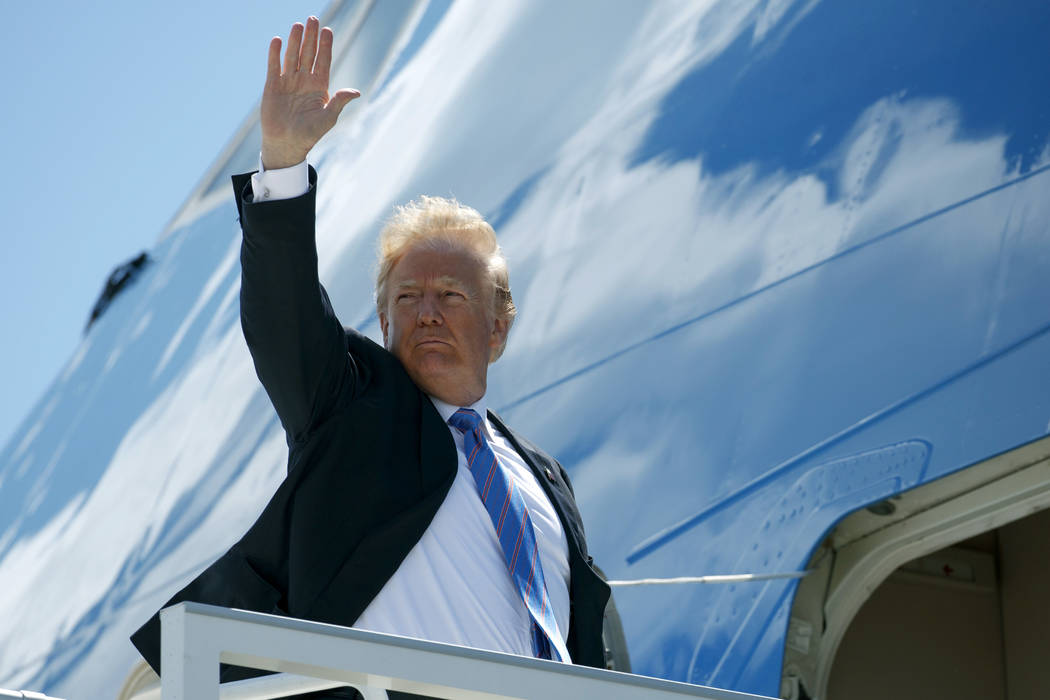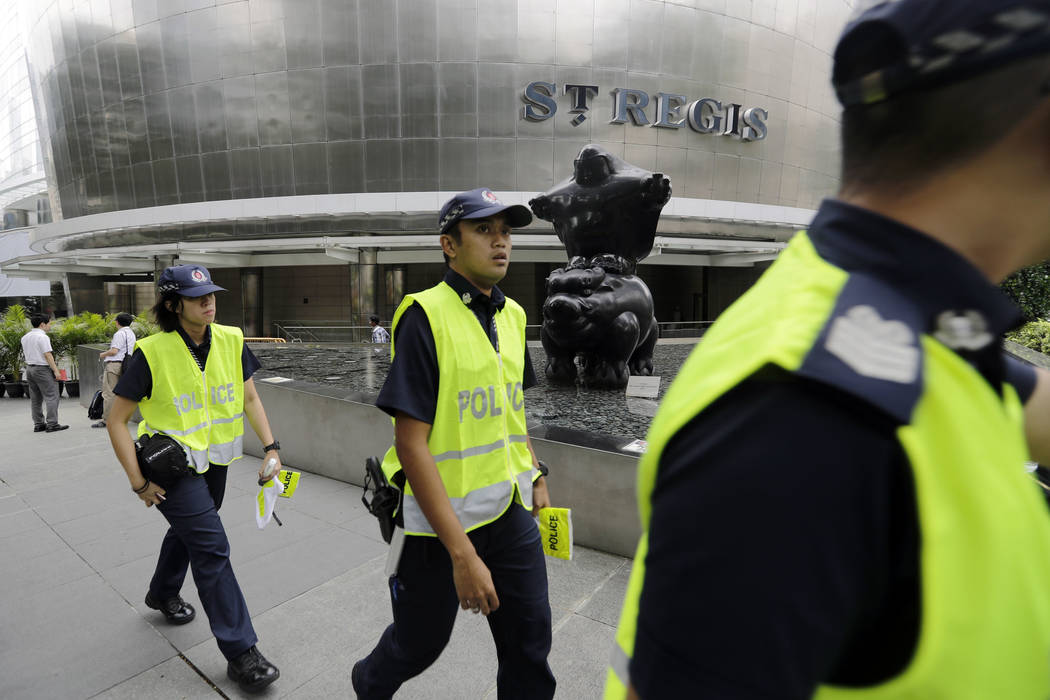Trump sets off for Singapore summit on ‘mission of peace’


SINGAPORE — President Donald Trump left the Group of Seven summit with America’s closest allies earlier than planned Saturday and jetted to Singapore for a high-stakes meeting with North Korean leader Kim Jong Un.
The juxtaposition could not be more stark. Canadian and European Union leaders have been enraged at Trump’s decision to levy tariffs on their aluminum and steel. Meanwhile, Trump seems to have gone out of his way to make peace with Kim.
In a world where seating decisions can be more clarifying than foreign-policy papers, Trump left a deputy assistant to fill in for him at the G-7 while Air Force One took off weighted with an entourage that featured Secretary of State Mike Pompeo and national security adviser John Bolton.
If Trump needled European leaders on trade issues — and further infuriated the likes of British Prime Minister Theresa May with his suggestion that Russia rejoin the select group of global powerhouses, from which it was ejected in 2014 — his tone toward Kim has been solicitous and upbeat.
Trump said Saturday that he was embarking on a “mission of peace” as he left the meeting in Canada. Saying he has a “clear objective in mind” to persuade Kim to abandon his nuclear program in exchange for unspecified “protections” from the U.S., Trump acknowledged that the direction of the high-stakes meeting is unpredictable.
“It’s unknown territory in the truest sense, but I really feel confident,” he told reporters. “I feel that Kim Jong Un wants to do something great for his people and he has that opportunity and he won’t have that opportunity again.
“It’s a one-time shot and I think it’s going to work out very well,” he added.
Ahead of the landmark summit, U.S. allies and many Republicans raised concerns that Trump may impulsively give in on issues they say should be deal-breakers for the United States. Ambiguity about exactly what “denuclearization” must look like has left some wringing their hands, while others fear he may yield on a longtime North Korean wish that the U.S. withdraw some or all of its military presence on the Korean Peninsula.
There also are worries from some quarters about Kim’s intentions and his willingness to actually follow through on any commitment he might make in Singapore.
“My suspicion remains that he is going to try to get as much sanctions relief as possible without having to give up his weapons,” Sen. Marco Rubio, R-Fla., said.
Unorthodox commander in chief
Trump’s supporters maintain that only the unorthodox commander in chief would dare accept Kim’s invitation for a face-to-face meeting. And that’s because Trump is not constrained by feckless Foggy Bottom conventions that have failed to prompt North Korea to denuclearize, they argue.
Wrong, counter aides and acolytes of past administrations. Past presidents didn’t fail to meet with Kim or his father Kim Jong Il because they lacked imagination; rather they chose not to give Pyongyang’s first family a public relations coup absent meaningful reforms and disarmament.
For his part, Trump has managed to frame the first meeting between an American president and North Korean leader with all the drama of a TV series cliffhanger.
In March, Trump gave a quick yes to Kim’s invitation to meet. On May 24, Trump called the whole thing off after North Korea threatened a “nuclear-to-nuclear showdown” and insulted Vice President Mike Pence.
By June 1, the summit was on again after North Korea’s No. 2 official delivered a letter from Kim to Trump at the Oval Office.
The temporary cancellation did serve an important function — it dampened what Stimson Center research analyst Jenny Town called “very bad expectation management.”
Once the summit was back on, Trump stopped talking in terms of a huge denuclearization deal and instead began referring to the meeting as a “process.”
But if there is no big denuclearization deal, what’s the point? Trump frequently has harped on the Iran nuclear deal’s failure to curb Tehran’s nuclear ambitions under President Barack Obama’s leadership. So how can he settle for a “process”?
On that score, Pompeo sounded more muscular when he said, “And you can be sure that President Trump will not stand for a bad deal. The United States has been clear, time and time again, that complete, verifiable and irreversible denuclearization of the Korean Peninsula is the only outcome that we will find acceptable.”
Test of deal-making prowess
There will be drama. Trump repeatedly reminds reporters that if he doesn’t see a good deal, he’ll walk.
During a press conference in Canada before he flew to Singapore, Trump was asked how long the process should take. “I think within the first minute, I’ll know,” he responded.
“I think I’ll know pretty quickly whether or not, in my opinion, something positive will happen. And if I think it won’t happen, I’m not going to waste my time. I don’t want to waste his time,” said Trump, who prides himself on his deal-making prowess.
In Singapore, Kim, the 30-something North Korean leader, will leave the confines of his hermit kingdom and walk onto the world stage.
Will viewers see a leader who publicly executes critics, allegedly ordered a painful death of his half-brother and has squandered his country’s wealth on an arms race? Or will they see a young leader committed to an international charm offensive?
Singapore, a thriving modern city-state dotted with high-rises, bold architecture and verdant open spaces, is poised for the glare of the international spotlight.
The U.S. and North Korea agreed to hold the June 12 summit in Singapore because it is considered politically neutral and it can provide a secure venue.
The one-day summit will be held on the island of Sentosa, known for its beaches, golf courses and spas. Formerly known as Pulau Blakang Mati — meaning “death from behind,” a likely reference to its pirate roots — Sentosa means “peace and tranquility.”
The government of Singapore has strict limitations on public protests and rigid security measures will be used around the Capella Singapore, the hotel on Sentosa where the talks will be held.
Two South Korean journalists were arrested Thursday for trespassing at the North Korean ambassador’s home, the Straits Times, Singapore’s leading paper, reported.
“Those who break the law will be dealt with firmly,” Singapore police have warned.
Contact Debra J. Saunders at dsaunders@reviewjournal.com or 202-662-7391. Follow @DebraJSaunders on Twitter. The Associated Press contributed to this report.













